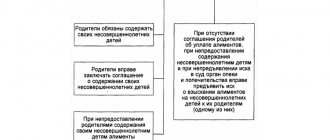25
According to the current norms of Family Law, both parents of a minor child must equally participate in his upbringing and financial support. But, as practice shows, when a marriage is dissolved, the second spouse forgets about the obligations imposed on him by law, so he has to appeal to justice.
Conducting alimony proceedings hardly ends with full payment of the accumulated debt, because violators hide behind unemployment, lead an immoral lifestyle, or leave for other cities supposedly to earn money. Along the way, alimony payers accumulate an unaffordable debt, and the children never receive sufficient financial support.
Therefore, in order to make the procedure for collecting alimony easier and more efficient, significant amendments to legislative norms in this area were adopted.
Law on alimony in Russia 2020
The adoption of amendments to the current legislation is due to the low level of collection of funds in favor of children by divorced or separated parents. But many of the points remained unchanged. And in the coming year, paperwork for such debts will take place on the basis of the following important principles:
- Every child has the right to receive financial assistance from a parent living separately, without any exceptions or restrictions;
- if it was not possible to notarize a voluntary agreement between the parties for payment, then grounds arise for filing a corresponding claim in court;
- An additional authority for influencing debtors is the Bailiff Service.
Interesting! According to the government press services, in 2020, the largest number of significant amendments to family legislation were adopted within the framework of the issue of collecting alimony from debtors for all times of the existence of this social institution. At the same time, the size and amount of alimony will not change significantly.
But there are still bills that were not passed in 2017 and may be considered later.
So, this year we can expect that the following changes will receive legal force:
- mass dissemination of information about debtors in public transport and public places;
- restriction of the use of many government services, including registration of marriages in the registry office, request for the issuance of a foreign travel document, etc.
Note: According to the authors of these bills, such measures will help encourage persistent defaulters to pay off their debt. Opponents of these changes believe that the publication of information about debtors violates not only the rights of the payers themselves, but also their children.
Information guarantee
Now, alimony defaulters may be deprived of not only their driver’s licenses, but also denied access to various government services. For example, difficulties will arise in obtaining a foreign passport, passing the exam at the traffic police to obtain a driver’s license, registering a marriage at the registry office, etc. This innovation involves close cooperation with many government departments.
The changes in the law affected not only the technical part of working with defaulters. The implementation of such a program also involves the refusal of payments for the maintenance of elderly parents if in the past they were on the list of persistent non-payers of alimony. Thus, a fair settlement occurs, which implies a refusal to burden the children with their maintenance.
If the payment of alimony occurred without violations, then when one of the parents reaches a non-working age, the court may order the adult child to pay alimony for the maintenance of the parents.
Banks also express their readiness to cooperate with bailiffs. Their role will be to refuse to issue loans, as well as to carry out any financial transactions if the client has a certain amount of alimony arrears.
Changes in last year's alimony payments
Last year, a rule was adopted that provides for alternative types of payments in favor of minors (bill No. 277183-7), if the location of the debtor could not be established or he was missing. In this case, the Federal Pension Fund must make payments in favor of children until they reach adulthood, referred to as a survivor's pension. An initiative to accrue payments may be filed with the court after one year from the start of the search.
The law proposed:
- Set a maximum period of 1 year for bailiffs to search for a debtor;
- After its expiration, close the enforcement proceedings by inviting the claimant to a conversation and providing him with advice on filing a claim in court to declare the alimony payer missing.
- Wait for the decision and, based on it, receive a survivor’s pension in the child’s name.
This bill has so far been sent for revision and, judging by preliminary reviews, does not have any chance of success.
Note: The need for additional influence on alimony payers who are hiding from fulfilling their duties is long overdue. Hundreds and even thousands of maintenance payers leave for other cities where they can hide for years from the obligations imposed on them by law and court decisions. Children are left without any financial support.
In July 2020, another bill was developed and adopted, the task of which is to create special bank accounts necessary for crediting only those amounts of money intended for minors. This is done so that creditors and government agencies cannot independently write off money intended for children. That is, such accounts are issued in the name of the parent with whom the child lives and are inviolable.
It is proposed to oblige non-payers to pay rent for their child
One of the most important problems that arise after parents divorce is providing their children with housing. The current legislative norm, enshrined in paragraph 4 of Art. 31 of the Housing Code, establishes certain guarantees for former family members of the owner. They relate to the preservation of the right to use residential premises for former family members and the possibility of the court imposing the obligation to provide them with housing on the former spouse.
Due to the high cost of acquiring real estate property, the most optimal option is when a parent living separately from his children will be obliged to pay for their rent (rent) of housing. This initiative was taken by the Ministry of Justice of the Russian Federation, which began to develop a corresponding bill. It is possible that already in 2020, a norm regulating the procedure for establishing “housing alimony” will be enshrined at the legislative level.
Minimum child support in 2018
Considering that a bill fixing the minimum amount of payments in favor of minor children was not adopted, the share distribution, which is based on the level of income of the alimony payer, still remains in force.
The following are subject to deduction:
- a quarter of the amount of income when making payments in favor of one child;
- a third of the funds earned if assistance is provided to two children;
- half of all earnings when supporting three or more children.
Since the salary of an officially employed Russian cannot be lower than the minimum wage, the minimum amount of alimony will be calculated based on these indicators.
In this part, starting from 2020, both payers and recipients of alimony will face very significant changes.
So, from the beginning of January 2020, the new minimum wage amount will be 9,489 rubles.
Based on this, payments in favor of minor children cannot be less than:
- 2372 rubles in favor of one child;
- 3163 rubles for two children;
- 4744 rubles for the benefit of three or more children.
In addition, there remains the possibility of payment in a fixed sum of money, which is negotiated by the parents when drawing up a voluntary agreement with a notary. This amount does not depend on the income of the parties, but cannot be below the subsistence level. The cost of living remains unchanged for now.
What has changed in 2020?
Now 2020 sets a new framework - the bill will indicate a specific minimum amount , less than which it will not be possible to pay alimony: payment is traced through the courts, and the share of the minimum wage also affects this (the average figure for the Russian Federation in 2020 is about 6 thousand rubles).
The following figures are dictated (in approximate equivalents): one child turns out to be about 1,500 rubles. (+50-60 rub.), two receive 2000 rub. (same increase) and so on - 3000 rubles. (+100 rub.).
The changes also affected persons who have reached the age of majority - payment of alimony will continue at the time the child enters the university as a full-time student and will end at the time of graduation; The main condition here is the age limit of 23 years.
Supporting the educational and material base will help the family improve their internal relationships. A sort of separation occurs: one parent pays for the child’s education, and the second can realize his parental capabilities in terms of upbringing and development.
Innovations in the collection of alimony
The need to further improve the collection procedure is associated with the disappointing level of payments in favor of minors from parents living separately.
In particular, attention was focused on limiting certain rights and freedoms of negligent debtors. Thus, the adopted legal norms provide for the following possibilities of legal influence on alimony payers in the event of their malicious evasion of their obligations:
- temporary loss of the ability to drive a car or other modes of transport due to restrictions on the use of a driver’s license;
- inability to travel outside the state (regardless of the purpose of the trip) until the debt has been fully repaid;
- application of administrative sanctions in the form of correctional labor, arrest or penalties.
Attention! The practical application of one sanction does not exclude the possibility of additional use of another.
But the most important step is a significant expansion of the powers of the Bailiff Service, which received complete freedom of action to detain and apply legal sanctions to the violator, in fact receiving powers similar to law enforcement agencies.
The competence of the bailiffs includes holding the defaulter accountable under Art. 5.35.1 of the Code of Administrative Offenses of the Russian Federation, and under Art. 157 of the Criminal Code of the Russian Federation.
IMPORTANT: The key problem remains evasion of alimony payments with their formal payment from minimum incomes. Such situations arise when the alimony payer clearly has sufficient earnings for a normal life, but officially receives unemployment benefits or payment in the amount of the minimum wage, from which the minimum alimony is deducted.
Confiscation of rights for non-payment
Another innovation for 2020 will concern those defaulters whose debt amount is 10,000 rubles or more. It implies the deprivation of a driver’s license, both on its own initiative and according to the application of the recipient.
This measure will not affect the following categories:
- Persons who officially use their car as the main source of income;
- Drivers with a disability group;
- Parents who use their car to transport minor children to educational institutions;
- Persons who live or work in hard-to-reach areas.
Confiscated rights are returned after the resulting debt is fully repaid. If the debtor was stopped on the road and did not have a license with him, he is subject to penalties in the amount of 2,500 to 30,000 rubles.
Bills on alimony
In 2020, several bills were under consideration by the government. Some of them have been adopted and come into force in January 2020. Others were postponed indefinitely. The remaining part has sunk into oblivion and is unlikely to ever be considered.
In particular, in 2020 it was not possible to wait for the following positive changes regarding the improvement of the mechanism for maintaining children by parents living outside the family:
- At the moment, there are no limits on the amounts within which money can be collected to retain minor children. The required amount of contributions is considered in each situation separately. A decision was made to adopt a minimum size, but this project was rejected.
- The organization of the Alimony Fund, which implied the payment of minimum maintenance from the municipal budget in favor of children, was also not authorized until the alimony payer could be brought to justice. Then it was planned to compensate the paid amount in favor of the budget from the negligent parent. The project did not receive approval from the Government due to lack of funds and excessive financial burden. In addition, the bill did not reflect the mechanism for calculating alimony, which was to be paid from budget funds.
- The possibility of additional recovery of sums of money for the formation of appropriate living conditions, provided the child was in need, was considered, but this provision was not adopted either.
- There was also a proposal to extend the period of financial support for a child even after he reaches the age of majority, if the child is studying at the Higher Educational Institution, by analogy with the survivor’s pension. But it was decided to leave the time limit for payments until the 18th birthday.
Thus, many of the current rules regarding the collection mechanism have been changed, but there have been no significant innovations. As the government has said, many bills have been shelved and may be adopted later if the new rules do not achieve sufficient results.
Family policy concept
Last year, the government approved the Concept of Family Policy of the Russian Federation, which involves the full repayment of all debts to children's guardians. In particular, by 2025 it is planned to completely eradicate the situation where child benefits are not paid. One of the proposals is to create a certain alimony fund , which will accumulate payments and government subsidies, and distribute them among parents who do not receive alimony. In this case, the defaulter becomes a debtor of the state.
Is the alimony worker unemployed?
Another interesting bill is designed to expand the powers of bailiffs, giving them the right to assist in the employment of those alimony payers who are ready to fulfill their duties, but do not have the income to do so.
By analogy with the criminal-executive inspection, which has the right to issue employment orders to persons serving correctional labor, it was proposed to transfer similar powers to the FSSP.
According to the provisions of the bill, bailiffs were proposed to be given the right to:
- Refer job seekers to the employment center or organization if there is information about vacancies there;
- Request information about vacancies in institutions and organizations;
- Cooperate with various employment centers.
So far, there is no information about the outcome of consideration of this project, but the initiative seems interesting and topical in light of the acute shortage of jobs in the country.
Assisting debtors in finding a job
According to the norms of Russian legislation, alimony payments are considered a priority and have great social significance, therefore all alimony payers must be employed, they must have a constant and stable income to fulfill their alimony obligations.
In this regard, in 2020, changes are planned to be made to the legislation on employment, thanks to which bailiffs will be able to issue referrals to Employment Centers for alimony payers to seek employment. In this case, service specialists will be required to look for work for such citizens first.
In addition, the following condition will have to be met: during the period of job search, the alimony payer will have the right to receive unemployment benefits. It is from this income that the alimony debt will be deducted in favor of the claimant of funds (in the amount of 70 percent of the amount received).
From when does alimony begin?
“When will alimony payments start to be withheld?” - this question arises often and has a clear answer. As soon as a claim for payments for a minor child is filed in court and registered in the records department, the defendant becomes obligated to pay child support. When the court decision comes into force and is transferred to the parent’s employer, the calculation begins and alimony will be paid for the entire period from the date of filing the claim.
Please note: in some cases, the plaintiff may apply to the court with a request to accrue alimony for the past time. This time should not exceed three years.
To do this, the claimant must prove that he tried to obtain child support from the other parent using the means available to him, but these attempts did not produce results. To claim alimony for the past period, you will need significant evidence. The court will be interested in printouts of correspondence, audio recordings of conversations, phone calls, and letters. If this evidence is found convincing by the court, it will oblige the debtor to pay alimony for the past 3 years.
The three-year rule only applies to cases where the plaintiff is filing a lawsuit for the first time. If a claim for alimony was filed earlier, then it does not matter how many years the defendant has not paid it. Child support will be withheld from the date the claim is filed, even if it happened more than three years ago.
The date of divorce, as well as litigation on the division of joint property, does not in any way affect the start of alimony payments. The claimant may file a claim for alimony later or even earlier than the day of divorce.
Indexation of alimony by the employer
Another new law dated November 14, 2017, No. 321-FZ, adopted changes to Art. 117 of the Family Code of the Russian Federation and some articles of Federal Law No. 229-FZ “On Enforcement Proceedings” concerning the indexation of alimony and debt due to non-payment. Now the responsibility for indexing payments lies with the employer , regardless of who presented the writ of execution at the workplace - the claimant or the bailiff.
Cancellation agreement
Payments can be terminated by mutual agreement. In this case, the parties must enter into an appropriate agreement. This is especially true if an alimony payment agreement was previously drawn up.
There are conditions that must be adhered to when drawing up the document correctly:
- The principle of voluntariness must be observed. If one of the parties does not want alimony to be cancelled, the issue will have to be resolved in court.
- Both parents must have legal capacity.
- The agreement must be certified by a notary.
- The document indicates the reason why payments are stopped.
If in the future the recipient wants to collect money for this period of non-payment, he will not be able to do so because of the agreement.
Sample receipt for alimony
If the amount of payments for a child is established by the court ( in shares or a fixed amount), then the parties have the right to choose the procedure for receiving alimony independently. When money is transferred from hand to hand, it is recommended to draw up a document that will legally record this fact. Such a document is a receipt for the transfer of funds, a sample (form) of which can be downloaded here, and it looks something like this:
As a rule, a receipt is drawn up when the parents have entered into a voluntary agreement to pay child support.
The receipt can be drawn up in 2 copies with the signatures of the payer and the recipient of the money, or in one copy, in the latter case it is signed by the recipient of the money and remains with the payer as evidence of the fulfilled obligation.
Lawyers advise writing a receipt in the case when not the main part of the alimony is transferred, but additional, voluntary payments for the maintenance of the child. The recipient of the money can write it himself, print it on a computer, or download several forms in advance and fill them out as needed.
Recipient refusal
In some cases, the cancellation of alimony may be initiated by the recipient (the child's guardian). By law, this can be done through the FSSP or from a notary. In the first case, enforcement proceedings are suspended. To do this you need:
- Issue a written refusal of alimony.
- Submit it to the bailiff conducting the case.
- Wait for an answer.
Refusal to collect alimony must be motivated. The interests of the child will be taken into account first, so it is important to explain your decision. In practice, refusal is most often used if the child’s guardian does not need financial assistance due to his financial well-being.
If the parents have drawn up a notarized agreement on the payment of alimony, then the refusal is formalized in a similar way. The parties must contact a notary and terminate the contract. Unilateral termination is excluded, so controversial issues should be resolved in court.
Cancellation of spousal support
In addition to children, an adult capable person may have other dependents. And it's not just elderly parents. For example, in some cases, maintenance may be required by the ex-wife (Article 89 of the RF IC):
- If she is disabled and cannot support herself. In this case, the incapacity (disability) must occur during the marriage or within 1 year after the divorce.
- The spouse is pregnant or raising a child under 3 years of age. In this case, alimony can be collected during the marriage.
- She takes care of a disabled child.
The amount of payments always depends on her needs and the solvency of her spouse. For example, if he pays child support for a common child under the age of 3, then his mother can additionally collect half of this amount for herself.
Collection of payments in these cases is carried out either forcibly in court or voluntarily through an agreement. As for the cancellation of alimony payments ahead of schedule, it may occur for the following reasons:
- The spouse has regained her ability to work and provides herself financially.
- The woman got married again and is supported by her new husband.
- A child with a disability has regained his legal capacity.
According to general rules, cancellation of payments is carried out in court or before a notary.







